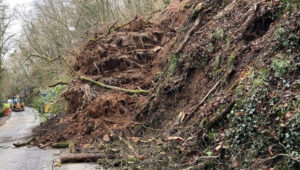With temperatures forecast to drop this week Devon’s highways teams say they’re prepared to face whatever the elements throw at the county’s roads over the next few months.
Gritting depots across the county are fully stocked with around 24,000 tonnes of salt and Devon County Council’s upgrade of its winter fleet has continued, with eight of its 37 frontline gritters replaced with newer models this year.
These latest gritters are kitted out with touchscreen controls to adjust the position of the plough attachments, enabling drivers to pull over and make adjustments without leaving their cab. Previously they would have had to venture outside of their vehicle to manually make adjustments and lock the plough into place.
To ensure resilience of staffing numbers, contractor Milestone Infrastructure is once again ensuring that three gritter drivers per route are on standby throughout the season.
This winter, Devon’s fleet of gritters will be running on sustainably sourced Hydrotreated Vegetable Oil (HVO), which is a waste product from the food industry. The fuel produces 90% less CO2 than regular diesel which will help meet Devon County Council’s net zero targets by 2030.
A trial to salt some of Exeter’s busiest cycle routes will also be extended to continue throughout this winter.
Councillor Stuart Hughes, Cabinet Member for Highway Management, said: “Temperatures have been above average for this time of year which has meant our gritting teams have only been called into action once so far this season, but it’s set to get colder. As usual, they are ready to help keep Devon moving over the winter months. Last winter was fairly mild and we used less salt than in an average winter, but the county was battered by a number of named storms which meant that a lot of the response from Devon Highways was clearing up the damage and debris on our roads.
“Our gritter drivers have to contend with some of the most severe driving conditions and the latest gritters added to our frontline fleet should help make their job safer and easier as the position of the snow plough is controlled from their cab. I also welcome the use of the sustainably sourced HVO fuel which will help us meet our commitments to help tackle the climate emergency. Continuing the trial to treat some of Exeter’s busiest cycle routes will help people to use active travel all year round which is also good news for the environment.
“Our snow wardens working for town and parish councils are continuing with their essential support to help their communities to be more resilient. If we all work together as a team we’ll get through whatever the winter weather throws at us.”
Simon Kane, Contract Manager for Devon Highways at Milestone Infrastructure, said: “Every year we focus our efforts to ensure we have the resources, planning and training in place to deliver an efficient and effective winter service for the communities across Devon. Our team of well-trained gritter drivers frequently work during the night, often in the worst of conditions when the public are advised to stay at home. Their courage and commitment to treat Devon roads is commendable. We ask people across Devon to support the work of our gritter drivers by ensuring cars are parked considerately in villages and towns to ensure the gritting vehicles can negotiate the gritting routes, helping us to keep them safer on the roads in bad weather.”
Last winter, around 8,300 tonnes of salt were used on Devon’s roads. That was below the average winter figure of around 13,000 tonnes of salt.
Devon’s snow warden scheme, which celebrated its 10th anniversary last year, continues to provide additional support for communities as part of the Council’s winter self-help scheme. The 325 volunteer snow wardens across the county treat their priority routes during prolonged spells of severe weather.
Devon’s roads are monitored 24 hours a day, 365 days a year by staff at Devon’s Network Operations Control Centre in Sowton, Exeter.
The control centre enables parts of Devon’s highway network to be monitored remotely by using CCTV, weather information, traffic and congestion data. It is also able to control a range of Intelligent Transport Systems – such as variable message signs.
The systems at the control centre link to the county’s network of 38 ice detector weather stations at strategic locations across the county to check how conditions are affecting local roads.
More than 3,500 grit bins are located across Devon to support community self-help on roads which are not on the gritting network.
























